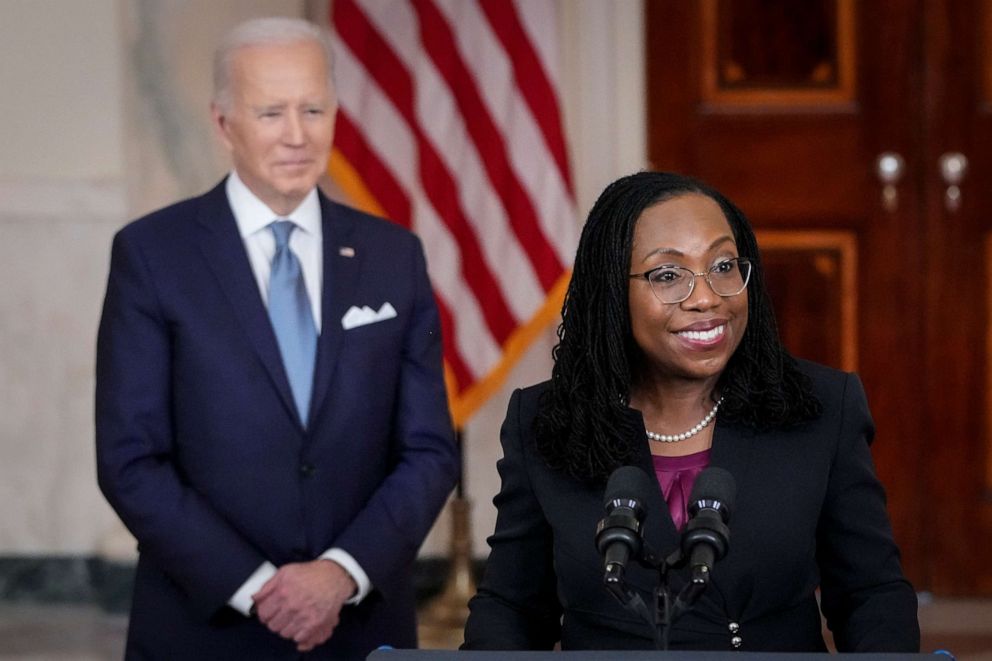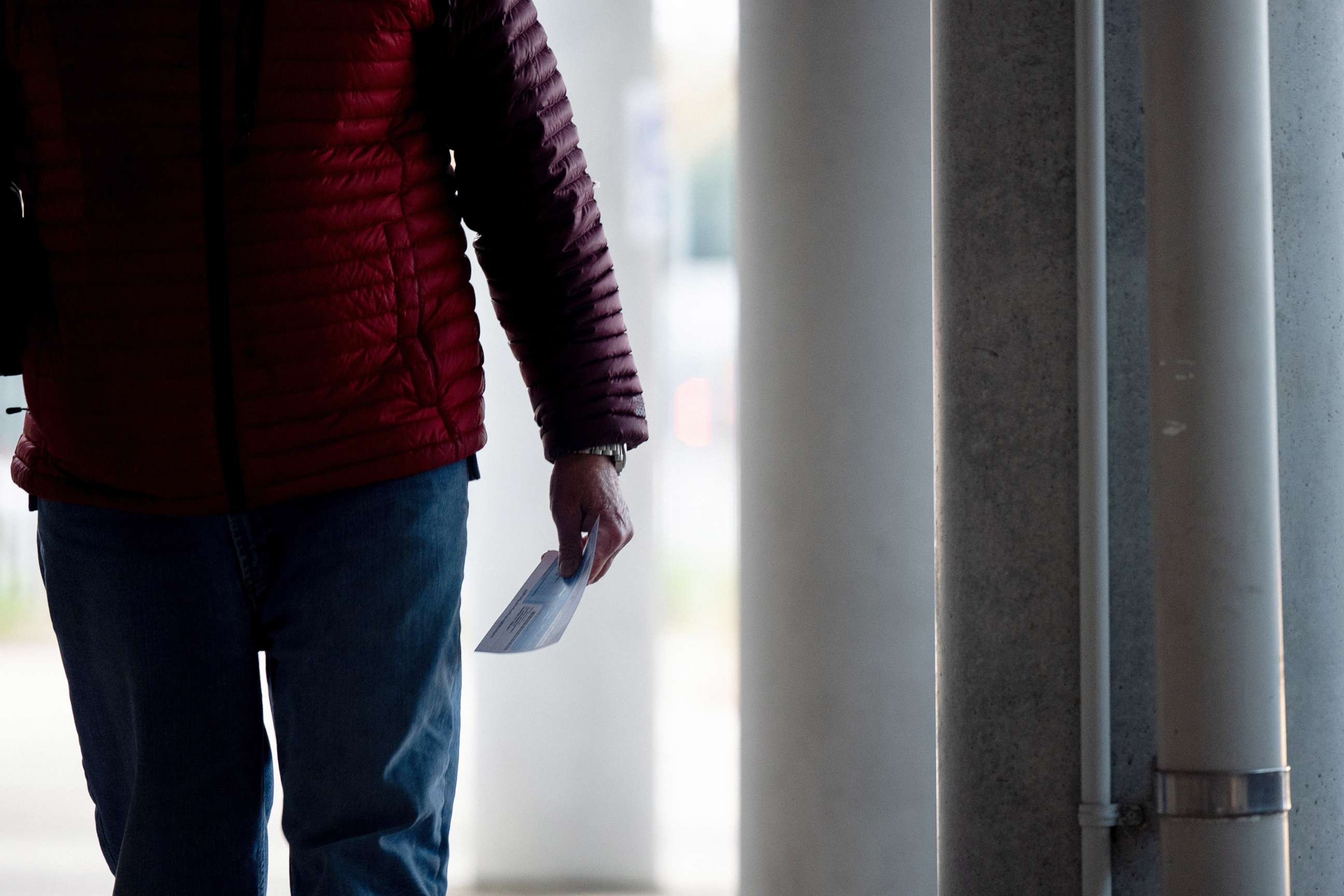Biden faces new Ukraine pressures on eve of SOTU: The Note
This moment showcases foreign policy and broad questions of national security.
The TAKE with Rick Klein
It won't be the State of the Union that President Joe Biden might have envisioned -- and quite suddenly, COVID restrictions are almost the least of it.
Russia's invasion of Ukraine has made this a moment that showcases foreign policy and broad questions of national security. And the divisions inside the Republican Party -- even those driven by former President Donald Trump -- aren't enough to shield Biden from pressures to act more boldly on multiple fronts.
That's in part because the pressure isn't solely political. Ukraine's ambassador to the U.S., Oksana Markarova, said on ABC's "This Week" that her country is "grateful" for the support it's gotten but that government and business entities can and should provide much more.

"We need more defensive weapons," she said. "It's time to take sides, and it's time to take Ukrainians' side."
Republicans like Sen. Tom Cotton, R-Ark., have been pressing Biden to get more weapons to Ukraine and to impose more severe sanctions against financial entities than those already laid out. Democratic lawmakers have also been agitating for bigger steps to be taken on a faster timeline than has been favored by the White House.
Biden comes to the current crisis and Tuesday's speech with career-low approval ratings across a broad range of issues. The latest ABC News/Washington Post poll finds just 43% trust in Biden's ability to handle a crisis and growing concerns about the impact world events might have on energy prices and overall security.
The White House has signaled an openness to taking further steps to protect Ukraine and rebuff Russia. Biden's challenge from here will be less about connecting the crisis to Americans' lives than in convincing voters that his steps are helping minimize what could be a far-reaching catastrophe.
The RUNDOWN with Averi Harper
The clock is ticking and Democrats want to move quickly after Biden's historic announcement of Judge Ketanji Brown Jackson as his pick to replace the retiring Justice Stephen Breyer.
Judiciary Committee Chairman Sen. Dick Durbin, D-Ill., wants to see Jackson confirmed before the start of the Senate's Easter recess on April 8. That amount of time would still be longer than Amy Coney Barrett's 30 days between announcement and confirmation.

Jackson is expected to begin meeting with senators before the start of confirmation hearings. Jackson is no stranger to the process. She has been confirmed by the Senate three times. She was last confirmed by the Senate in June to her post as United States Circuit Judge for the District of Columbia Circuit. Then, Jackson got three Republican votes, but that's not guaranteed this time around.
Sen. Mitt Romney, R-Utah, signaled openness to voting in favor of Jackson's confirmation Sunday.
"Look, her nomination and her confirmation would or will be historic and like anyone nominated by the president of the United States, she deserves a very careful look, a very deep dive," Romney told CNN. "And I will provide fresh eyes to that evaluation, and hope that I will be able to support her in the final analysis."
The reality is that Democrats don't need Republican buy-in. They only need a simple majority to confirm Jackson and if Democrats are unified since Vice President Kamala Harris could serve as the tie-breaking vote.
The TIP with Alisa Wiersema
This week, voters will head to the polls for the first midterm election day of the year, as Texans cast their ballots in the March 1 primary election. Apart from serving as a symbolic marker of the official start of the 2022 midterm cycle, the outcome of Tuesday's election will also give a better assessment of the impact of the state's new election law.
So far, the most visible aspect of the law includes the tightened voter identification requirement for those who are eligible to vote by mail. In order to successfully cast their mail ballots, voters must include either their driver's license number or the last four digits of their social security number on their ballots. The number they include must then match the number they originally used to register to vote.

Voters ABC News spoke with over the last month who had their ballot applications rejected were either unaware of the change or did not recall which information they first used on their voter registration -- leading to mismatched data. Although primary election voter turnout is already perpetually low in midterm election cycles, this kind of confusion from voters could compound that.
The exact number of voters who cast mail ballots and were affected by this provision continues to fluctuate, but election officials in the state's largest metro area of Harris County tell ABC just over 30% of mail ballots they received were flagged for correction specifically because of the new identification requirements. It now remains to be seen how many of those ballots get corrected by the time polls close Tuesday.
NUMBER OF THE DAY, powered by FiveThirtyEight
47. That's the percentage of Americans who disapprove of the way President Joe Biden has handled the crisis in Ukraine so far, according to the latest ABC News/Washington Post poll. And as FiveThirtyEight's Nathaniel Rakich wrote on Friday, that is broadly in line with how Americans view Biden's handling of foreign policy more broadly, which is likely a hangover from this summer when his numbers on the issue first fell during the withdrawal of U.S. troops from Afghanistan. But as Nathaniel writes, Americans largely approve of the sanctions Biden has imposed on Russia, so it's possible Americans might end up giving Biden higher marks for how he manages the Russian invasion of Ukraine.
THE PLAYLIST
ABC News' "Start Here" Podcast. Start Here begins Monday morning with ABC's Matt Gutman from the Ukraine border, where there is a growing refugee crisis. Then, ABC's Anne Flaherty breaks down the latest CDC guidance on COVID-19 protocols. And, ABC's Devin Dwyer gives details on President Joe Biden's nominee to serve on the Supreme Court. http://apple.co/2HPocUL
WHAT YOU NEED TO KNOW TODAY
Download the ABC News app and select "The Note" as an item of interest to receive the day's sharpest political analysis.
The Note is a daily ABC News feature that highlights the day's top stories in politics. Please check back tomorrow for the latest.




